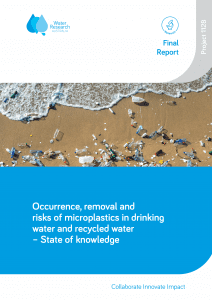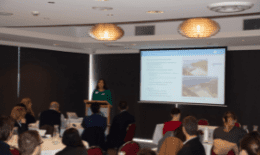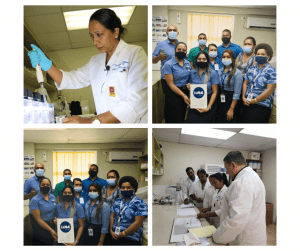The post New research | Understanding water quality risks under low and variable levels in water storages appeared first on Water Research Australia.
]]>Climate change is likely to exacerbate water shortages, with extended periods of drought, interspersed with more discrete and intense rainfall, leading to challenges for storing water in reservoirs and potentially affecting the quality of water.
Griffith University researchers have examined the water quality risks from low and variable water levels in dams and reservoirs in Eastern Australia. This research found that the water quality responses to low water levels were variable among the 12 reservoirs examined in detail.
The project’s Final Report and Factsheet are now available. While the Final Report is exclusive to WaterRA members, the Factsheets are available to the public, however a login is required to download the resources.
Visit our website now to discover how this study also examined the effect of climate change on catchment runoff to reservoirs using climate change models coupled with a hydrological model.
The post New research | Understanding water quality risks under low and variable levels in water storages appeared first on Water Research Australia.
]]>The post New research released analyses occurrence of microplastics in drinking and recycled water appeared first on Water Research Australia.
]]>Water Research Australia Project 1128 Occurrence, removal and risks of microplastics in drinking water and recycled water – State of knowledge provides a systematic analysis of the different sampling and analysis methodologies currently in use, as well as a summary of the concentrations, type, shape, and sizes of microplastics reported in drinking and reclaimed water sources and product.
Led by Griffith University, the research also reviewed the efficiency of current drinking and reclaimed water treatment processes to remove microplastics and discusses the current state of knowledge on potential human and environmental risks of microplastics in drinking and reclaimed water.
The report is also accompanied by a factsheet and are available for download by WaterRA members.

The post New research released analyses occurrence of microplastics in drinking and recycled water appeared first on Water Research Australia.
]]>The post Emerging chemicals database | Free access extended appeared first on Water Research Australia.
]]>ECHIDNA includes several unique features:
- Classification and filtering functionalities to group CEC based on key properties such as persistence, bioaccumulation and toxicity making it valuable across drinking water, recycled water and wastewater industries.
- An inbuilt risk prioritisation tool that identifies high risk contaminants ranking them based on the user-specified shortlist.
- Direct links to information on management options to address the risk of environmental and human health effects.
With over 200 subscribers to date, ECHIDNA has proved a useful tool for utilities, regulators, researchers, and consultants. The ECHIDNA project team has prioritised the following proposed additions to the functionality of ECHIDNA, based on extensive user feedback over the past year. The highest priority proposals are currently under development as Project Briefs and Requests for Funding (RFFs), and include:
- The addition of new contaminants.
- Occurrence data.
- The addition of biosolids, recycled water and untreated sewage to the risk framework.
- Sources of contaminants and integration with the CHASM stormwater tool.
- Remediation and removal options.
We encourage all members to register for free ECHIDNA access if you haven’t already, or continue to use and contribute to the database during this period of development.
The post Emerging chemicals database | Free access extended appeared first on Water Research Australia.
]]>The post New research awarded on Assigning Pathogen Log Reduction Values in MBRs appeared first on Water Research Australia.
]]>The research contract is currently being finalised and a kick off meeting has been planned for later this year.
For further information, please contact Marlene Hsu, WaterRA Research Manager.
The post New research awarded on Assigning Pathogen Log Reduction Values in MBRs appeared first on Water Research Australia.
]]>The post Extreme Events research showcased at water event appeared first on Water Research Australia.
]]>Water Research Australia’s Research Manager Marlene Hsu presented on our Extreme Events research at the 2022 ACT Water Matters Conference.
The 2019-20 bushfire season in Australia was unprecedented in its extent, duration, intensity and impact on the natural environment and human livelihoods. Periods of intense rainfall, particularly following a bushfire season, presented water managers with challenges at both the catchment and treatment plant scale.
Marlene shared the work that WaterRA’s members have been doing to increase the water industry’s future readiness – research designed for professionals to be able to plan, prepare, respond to, and recover from extreme events.
“In times of drought we are faced with the uncertainties of variable water quality and quantity,” Marlene said. “An acute understanding of these scenarios will help us to build a resilient water future.”
WaterRA’s series on Extreme Events was held during November 2021 and February 2022. The webinars took a close look at modelling, climate, complex river systems, community attitudes, extreme event response, and recovery among other important topics.

The post Extreme Events research showcased at water event appeared first on Water Research Australia.
]]>The post New release: Essentials guide to achieving value from research appeared first on Water Research Australia.
]]>Now in Phase 3, the Value of Research (Project #1118) has continued to be one of WaterRA’s flagship projects. The project has determined a successful pathway of how to best value research undertakings – including outcomes and outputs – that relies on a combination of evaluation processes and organisational culture.
The recently-released Good Practice Essentials Guide is a summary of the Good Practice Guide that was released upon completion of Phase 2. The Guide distils the fundamental elements and core principles of achieving value from research, providing easy to follow guidance and key questions that help drive and measure value creation and impact throughout the research lifecycle.
The Good Practice Essentials Guide provides a step-by-step approach to maximise the value of the research across the research value lifecycle, taking you through:
- What the Good Practice Research Lifecycle is and its phases
- Core concepts which maximise research value
- Good Practices and Principles and how to apply them through easy-to-follow questions
Download Essentials Guide
Phase 3 of the project will continue with key elements of the Good Practice Essentials currently being translated into our Research Value Analyser online tool which offers organisations the ability to assess their status and progress towards achieving the value and benefits of the research they undertake and, ultimately, enable benchmarking of the water industry and its research collaborators. The beta version of this online tool is currently in development and will be released soon.
If you wish to participate in the testing of the beta version of the tool please contact WaterRA’s GM of Research Services, Jacqueline Frizenschaf.
The post New release: Essentials guide to achieving value from research appeared first on Water Research Australia.
]]>The post Funding secured to kickstart work to combat threat of antimicrobial resistance in Australia appeared first on Water Research Australia.
]]>Led by Professor Erica Donner of UniSA, CRC SAAFE will tackle resistance to essential antibiotics, antifungals and antivirals that, if not addressed, could wipe up to $283 billion from the Australian economy by 2050.
Antimicrobials such as antibiotics, antifungals and antivirals are essential for managing disease in humans, animals and plants, however, their widespread use has led to microbes becoming resistant to them, rendering them ineffective, a phenomenon called antimicrobial resistance (AMR).
Prof Donner, CEO of CRC SAAFE, said in a statement that AMR needs to be tackled at its source, where it emerges and spreads between farms, in feed and food production systems, and in waste processing.
“Antimicrobials are used in so many ways. They are used to treat our livestock, our crops, and ourselves,” Prof Donner said. “They end up being flushed down toilets, sprayed in organic fertiliser, carried through water supplies, produce and stock feed. We need to do everything we can to stop the spread of resistance.”
Partners from the water, organic waste, aquaculture, horticulture, viticulture, animal feed and livestock sectors will work together to develop shared solutions to monitor, manage and mitigate the spread of AMR.
New technologies deployed will include IoT sensors, genome sequencing, artificial intelligence and advanced analytics. CRC SAAFE partners will develop solutions such as waste treatment technologies and new animal feeds and supplements.
Water Research Australia has partnered with CRC SAAFE to coordinate the water industry consortia throughout its 10-year duration. By bringing together the water sector under one banner, WaterRA will assist the sector to develop and deliver a one-health approach to understanding, treating, and maximising the opportunities that the AMR challenge brings.
WaterRA’s Senior Research Manager Dr Kelly Hill said this opportunity will see our partners working to protect Australia’s reputation and status as a provider of high-quality water and agricultural products internationally, our long-term reliability of water reuse and reducing the risk of AMR-related agricultural trade barriers.
“Being at the forefront of new developments in AMR management practices and by addressing factors that can reduce disease burden (such as water quality and waste management), developing alternative interventions, and ensuring appropriate and effectual treatment, the CRC will deliver both immediate and medium term benefits to industry, through outcomes such as improved treatment options, and water recycling benefits to the agribusiness community,” Dr Hill said.
To join the water industry consortia contact Karen Rouse or for more information visit the CRC SAAFE website.
The post Funding secured to kickstart work to combat threat of antimicrobial resistance in Australia appeared first on Water Research Australia.
]]>The post ColoSSoS work continues in Fiji appeared first on Water Research Australia.
]]>

Images courtesy Water Authority of Fiji
The post ColoSSoS work continues in Fiji appeared first on Water Research Australia.
]]>The post Collaborative research project celebrates success appeared first on Water Research Australia.
]]>Huan is a PhD student from University of Technology Sydney (UTS). Her project “A closed loop technology benefits wastewater treatment plants through sludge treatment” is working to develop a technology for improving antibiotic resistance genes and pathogen removal, enhancing anaerobic sludge digestion and boosting dewaterability of digested sludge.
The prize-winning project is part of collaborative research projects sponsored by Water Research Australia and the Australia Research Council, and will bring economic and environmental benefits to the water industry. WaterRA is supporting this research work via Project 2058 Understanding and Reducing the Spread of Antibiotic Resistance in Anaerobic Sludge Digestion supported by industry-partner South East Water.
“I am delighted Huan’s work has been recognised by the water industry and I would like to acknowledge the strong support from WaterRA and South East Water,” said Huan’s PhD supervisor, Professor Qilin Wang from the Centre for Technology in Water and Wastewater at UTS.

Image: WaterRA CEO Karen Rouse with Huan Liu.
The post Collaborative research project celebrates success appeared first on Water Research Australia.
]]>